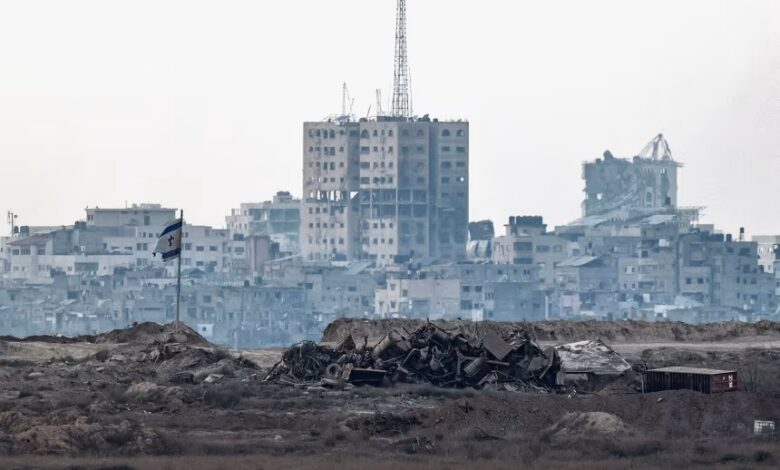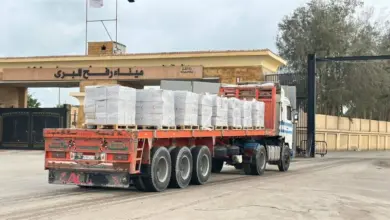
The cabinet approved plans to capture Gaza City, in the north of the territory, as part of Israel’s goals to destroy Hamas and rescue hostages the militants are holding. But the move raised fears further fighting will only endanger captives – and worsen an already dire humanitarian crisis.
The plan also brings Israel closer to fully occupying Gaza, something it has not done for nearly 20 years.
Here’s what we know about the decision that may reshape the war in Gaza.
What do we know about the plan?
After a marathon session, Israel’s security cabinet voted to adopt what it called “the five principles for ending the war.”
These include disarming Hamas, returning the hostages held there, the demilitarization of the enclave, Israeli security control of Gaza and the eventual establishment of a civilian administration that is neither Hamas nor the internationally recognized Palestinian Authority.
The five-month plan would take place in several phases, beginning with a takeover of Gaza City “while distributing humanitarian assistance,” according to the Prime Minister’s Office (PMO).
The deadline for the first phase, which includes the evacuation of Gaza City and an expansion of the aid distribution, is October 7, according to an Israeli source, intentionally picked to mark the two-year anniversary of the Hamas-led attack on Israel.
The plan would mean mobilizing thousands of soldiers already fatigued by months of fighting in the territory.
A satellite image captured on Friday morning by Planet Labs showed more than 100 military vehicles parked at a depot near Israel’s Nahal Oz crossing into Gaza – just two miles from Gaza City. The depot, located along the 1949 Armistice line, is surrounded by several defensive berms.
But the PMO said the “vast majority of cabinet ministers believed that the alternative plan presented in the cabinet would not achieve the defeat of Hamas nor the return of the hostages,” without making clear what that alternative plan was.
While Israeli Prime Minister Benjamin Netanyahu had told Fox News ahead of the meeting he intended to take full military control of Gaza, the announced plan is narrower, focusing, initially at least, on Gaza City.
Is there support for the plan?
In pushing ahead with this plan, Netanyahu is going against the wishes of much of the Israeli public and even key voices in the military.
Protests erupted in Israel ahead of the security cabinet vote. Families of the hostages warned the government against expanding the military campaign, saying Netanyahu is preparing “the greatest deception of all” by claiming that hostages can be freed through military means.
Netanyahu responded to the backlash by insisting that Israel does not intend to fully occupy Gaza and that the expanded military campaign is to “free Gaza from Hamas.”
“Gaza will be demilitarized, and a peaceful civilian administration will be established, one that is not the Palestinian Authority, not Hamas, and not any other terrorist organization,” Netanyahu said in a post on social media Friday.
“This will help free our hostages and ensure Gaza does not pose a threat to Israel in the future,” he added.

Fifty hostages remain in Gaza, at least 20 of whom are believed to be alive.
A group of mothers of Israeli soldiers also criticized the plan, saying it would be fatal for hostages and Israeli soldiers.
Opinion polls in Israel have consistently shown a large majority in favor of ending the conflict to secure the release of the captives.
Israel’s military has recommended pursuing diplomacy to end the war, fearing that an expanded operation could ensnare troops.
Israel Defense Forces (IDF) Chief of Staff Lt. Gen. Eyal Zamir warned of the danger of worsening the humanitarian crisis in Gaza and the international implications of the escalation, according to an Israeli source who spoke to CNN, who added that his warnings were brushed aside.
Netanyahu does have support from far-right members of his cabinet, who are propping up his coalition and have been pushing for a total takeover of Gaza.
There has already been strong international criticism of the plan – UK PM Keir Starmer said expanding the fighting would “only bring more bloodshed.”
Leaders from countries like France, Ireland, and Canada cautioned against the move, arguing that it would worsen the humanitarian situation in Gaza while also jeopardizing the lives of the remaining hostages.
Several Middle Eastern countries also condemned the Israeli government’s decision. Saudi Arabia’s Ministry of Foreign Affairs said that it disapproved of Israel’s “adamancy to commit the crimes of starvation of civilians, beastly conduct, and ethnic cleansing against our Palestinian brethren.”
The ministry said the decision demonstrates how the Israeli government does “not understand the existential, historic, and legal relationship that our Palestinian brethren have to that land.”
But key Israeli ally the US has effectively already given its approval.
Ahead of the Israeli decision to expand the war, Trump voiced no concern, saying it’s “up to Israel” whether to occupy the entire Gaza Strip, adding that he wanted more aid to enter the enclave.
What will this mean for Palestinians in Gaza?
The first stage of Israel’s plan – capturing Gaza City – entails the forced evacuation of up to a million Palestinians to southern Gaza, nearly half of the territory’s population.
The fighting has already devastated Gaza, killing tens of thousands of people and displacing almost the entire population.

A hunger crisis has taken over the Gaza Strip over the past few weeks as Israel has severely restricted the entry of aid and banned international aid groups from operating there, with authorities reporting daily deaths due to starvation.
The plan approved by the security cabinet foresees more aid distribution sites in the enclave. Israel and the US would increase the number of aid distribution sites operated by the controversial US- and Israeli-backed Gaza Humanitarian Foundation (GHF) from the current four to up to 16, according to an Israeli official with knowledge of the proposal.
But none of these new sites would be set up in Gaza City, in a move apparently designed to force the hundreds of thousands of people living there to leave by depriving them of access to food.
UN human rights chief Volker Türk warned on Friday that a takeover of Gaza City “will result in more massive forced displacement, more killing, more unbearable suffering, senseless destruction and atrocity crimes.”
UN Secretary-General António Guterres similarly said he was “gravely alarmed” by the Israeli government’s decision, which he warned would mark a “dangerous escalation” in the conflict.
Hamas condemned Israel’s plan to take over Gaza City as a “full-fledged war crime” that will come at a “high cost.”
Where does this plan leave Gaza in the long term?
The statements by Netanyahu’s office avoided references to an occupation of Gaza, which under international law would obligate Israel to provide basic services to ensure the welfare of the population.
But the plan does envision Israel eventually taking full “security control” over Gaza. The military says it already controls 75% of the territory, so seizing Gaza City would move Israel closer to full occupation.
Israel withdrew settlers and thousands of troops from Gaza in 2005 and Hamas took power soon after.

Beyond ruling out any role for Hamas, Netanyahu has given little clue on his long-term plans for the Gaza, so it is unclear whether the expansion means Israel will have a lasting presence in the territory.
Israel can militarily take over Gaza, but it will cost the country in the long-term, an analyst said, warning of the complications of a lengthy occupation.
But Ofer Guterman, a senior researcher at Israel’s Institute for National Security Studies, stressed that purely from a military perspective occupation of the entire enclave was possible.
“We have done it before. We were in Gaza for decades.”
CNN’s Ibrahim Dahman, Tim Lister, Kareem Khadder, Catherine Nicholls, Kevin Liptak, Helen Regan, Eyad Kourdi, Tamar Michaelis and Oren Liebermann contributed reporting.




